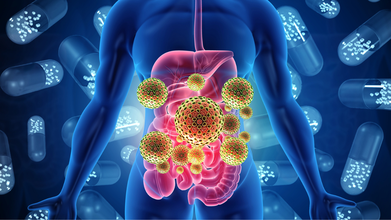- Health Conditions A-Z
- Health & Wellness
- Nutrition
- Fitness
- Health News
- Ayurveda
- Videos
- Medicine A-Z
- Parenting
To Peel Or Not To Peel: You Might Be Eating Kiwi The Wrong Way- Surprising Benefits To It

How to Eat Kiwi
The first bite of Kiwi is always a surprise—refreshing, tangy, and full of flavor. I have begun adding this to my morning routine because of its high in fiber, antioxidants and immunity-boosting vitamin C. It seems a small yet mighty step towards better digestion, radiant skin and a overall healthy beginning.
While we're all are used to eating only the vibrant green interior, a Maryland-based chronic pain specialist, Dr Kunal Sood, recently took to TikTok and revealed that the skin of the kiwi is actually a nutritional powerhouse that most of us are overlooking. Dr Sood has explained to his followers through a post that by removing the kiwi skin, one throws away about a significant portion of fibre, vitamins, and antioxidants.
"By consuming the skin, you increase the fiber content by almost 50%, aiding digestion and reducing bloating,” he said. That's especially significant given the role that dietary fiber plays in gut health, said helping feed the beneficial bacteria that support digestion and reduce cancer risk. High-fiber diets may lower the risk of cancers like esophageal, gastric, colon, and rectal, according to the American Institute for Cancer Research. Kiwi fruits, with or without peels, help fulfill some of the fiber in everyday consumption.
Doctors say everyone needs at least 25 to 30 grams of fibre each day in which women need at least 25 grams whereas men need 38. There are two kinds- soluble and insoluble fibres. The former works as a nourishment component for gut bacteria, hence produces compounds that do not let inflammation happen. Conversely, the latter one lets a person go to toilets on time and there can be less bloating.
Kiwi skin, according to Dr Sood, holds three times more antioxidants compared to the fruit itself. Antioxidants like vitamin C and E in the kiwi skin fight free radicals, which are highly reactive molecules causing cellular damage, accelerating aging, and increasing the risk of cancer. In fact, antioxidants enhance immunity and help with healthier, stronger skin. For their more complete and bioavailable forms, nutritionists often recommend getting antioxidants from whole foods rather than supplements.
And kiwis offer both vitamin C and E in spades, which can benefit skin elasticity and reduce oxidative stress for a healthier glow. Besides the health benefits on physical well-being, vitamin C can even improve mental wellbeing.
Researchers from New Zealand found that consuming vitamin C-rich kiwi can elevate mood in as little as four days. Considering the daily recommendation—90 milligrams for men and 75 milligrams for women—a serving of kiwi (especially with the skin) helps meet these needs while enhancing overall resilience against common health issues like scurvy, immune weakness, and skin dullness.
However, kiwi skin is not for everyone. High in oxalate content, people who develop kidney stones should be extra careful consuming kiwi skins. Others still find it unappetizing by the fuzziness. In fact, one TikTok user expressed that the hairy texture makes it a "sensory nightmare," with others labeling it too bitter despite all the nutritional advantages.
If the fuzz bothers you, you can try smooth-skinned gold kiwis or even puree whole kiwis into smoothies for a similar benefit without texture challenges.
Health Benefits of Kiwi
Kiwi is a fruit that boasts a lot of health benefits and cuts any diet above its own. Here are some highlights:
Fiber-Rich for Digestive Health
Kiwi, on the other hand, with almost half of its fiber content in the skin, aids in digestion, relieves bloating, and encourages bowel movements. It has also been found to reduce risks of digestive cancers and feed beneficial gut bacteria with high fiber intake.
Antioxidants for Cellular Protection
Kiwi's skin provides three times more antioxidants than the fruit itself, such as vitamins C and E. The antioxidants neutralize free radicals that cause cellular damage, slow aging, and fight disease.
Immune Boosting System
Kiwi is rich in vitamin C, which has the immune-boosting ability, and helps to recover people from diseases in a hurry, keep their skin and mental health fit.
Reducing Inflammation Abilities
Antioxidants can be found in kiwifruit, especially from the skin, which slows down inflammation, which most people need for chronic health issues, such as joint pain and heart disease patients.
Disclaimer: This article is for informational purposes only. It cannot be used as professional medical advice. Consult your doctor before changing your diet in any way.
At 66, Emma Thompson Lost 8kg by Ditching Diet Culture; Why Say This Approach Works

Credits: Wikimedia Commons
Dame Emma Thompson believes that eating well is never about punishment, food guilt, or obsessively tracking every bite. So what did she do to lose 8 kgs? She ditched diet.
Instead, she follows what she openly calls an “anti-diet” approach. It is not about restriction but awareness. She pays attention to what she eats, fuels her body properly, and still makes space for the foods she genuinely enjoys. That balance is exactly why the method has worked for her long term.
A couple of years ago, the 66-year-old actor and screenwriter lost around 8kg without falling into the trap of rigid rules or trendy superfoods. Rather than cutting entire food groups, Emma focused on consistency, structure, and realism. The result was not just weight loss, but better energy and a healthier relationship with food.
What the Anti-Diet Plan Looks Like in Real Life
Emma worked with Louise Parker, a trainer and nutrition coach known for promoting sustainable habits over quick fixes. The plan itself was calorie-controlled but far from extreme. It included three regular meals a day, each centered on protein to support muscle and keep hunger steady. These meals were paired with slow-digesting carbohydrates such as whole grains, vegetables, and fruit, along with healthy fats for satiety. Two snacks were also built into the day, removing the feeling of deprivation that often leads to overeating later.
The idea was not perfection, but rhythm. Eating regularly helps stabilise blood sugar, reduces cravings, and prevents the binge-restrict cycle that derails many diets. This structure alone can make a significant difference for people who have spent years jumping between extremes.
Why Enjoying ‘Forbidden’ Foods Matters
One of the most refreshing aspects of this approach is that no food is completely off-limits. Emma has spoken openly about enjoying things like cheese, bacon, and even wine occasionally. This is not indulgence for the sake of it. It is a strategic choice.
When people label foods as “bad,” they often end up craving them more. Allowing flexibility removes that psychological pressure. Interestingly, many foods marketed as healthy can be more calorie-dense and less satisfying than traditional options. By eating foods she actually enjoys, Emma avoided the constant feeling of missing out, making the plan easier to maintain over time.
A Rejection of Crash Diet Culture
Emma’s resistance to dieting is deeply personal. Earlier in her career, she tried crash diets and paid the price. She has spoken candidly about how dieting disrupted her metabolism and negatively affected her mental health. Like many people, she was sold the promise of quick results, only to experience long-term consequences.
This honesty highlights an important truth. Extreme restriction may deliver short-term weight loss, but it often damages the body’s ability to regulate hunger and energy. It also fuels a harmful cycle of guilt and rebound weight gain.
The Role of Exercise and Lifestyle Habits
Food was only one part of the equation. Emma also followed an intense fitness routine that included resistance training and ballet-inspired movement. Strength training plays a crucial role in preserving muscle mass, improving metabolism, and supporting long-term weight management. Alongside exercise, sleep, recovery, and mental wellbeing were treated as non-negotiables rather than afterthoughts.
Why This Approach Is Easier to Stick To
Behavioral science consistently shows that
sustainable change comes from habits that fit into real life. Flexible eating patterns that allow enjoyment, regular meals, and adequate nourishment reduce reliance on willpower. When people stop viewing food as the enemy, consistency becomes far more achievable.
Emma Thompson’s “anti-diet” approach works because it respects both biology and psychology. It replaces punishment with practicality, and restriction with balance. That combination is what turns healthy eating from a temporary phase into a lifestyle that actually lasts.
Christmas Delights Mince Pies Urgently Recalled In UK, Know Why

Credits: Canva
Mince pies, a Christmas delight, has been recalled just a few hours before Christmas in UK, over dangerous 'health risks'. The Food Standards Agency (FSA) warned consumers that there could be certain allergies and intolerances that could occur.
Why Are Mince Pies Recalled?
Shallow Brandy Mince Pies by the Bakewell baker have been recalled because it contains milk, "which is not mentioned on the label", noted the FSA notice, issued on December 23.
"The product is a health risk for anyone with an allergy or intolerance to milk or milk constituents," read the FSA notice.
The affected batch include six packs with the following best before dates: 2 February 2026, 3 February 2026, 4 February 2026, and 5 February 2026.
What Does The FSA Notice Say?
Why is the product being recalled?
We have identified that it has been labels incorrectly. Allergen missing. Product contains
milk not declared labels an ingredient has. This may pose a risk to customers.
What should customers do?
Please call the office.
• If you have purchased this product, please do not consume it.
• Return it to the store where it was bought for a full refund. No receipt is required.
FSA issued a "do not consume" notice to warn customer who could be affected.
What Happens When Lactose Intolerant People Consume Milk Or Milk Based Products?
When lactose intolerant people consume milk or milk-based products their bodies cannot properly digest the lactose sugar, leading to uncomfortable digestive symptoms like gas, bloating, cramps, abdominal pain, rumbling sounds, nausea, and diarrhea, usually within 30 minutes to 2 hours, because the undigested lactose ferments in the gut. Severity varies by individual, but it's generally a harmless condition, manageable by limiting dairy or using lactase supplements, and is different from a milk allergy.
Common Symptoms
- Gas & Bloating: Bacteria in the large intestine ferment the lactose, producing gas and causing the gut to stretch.
- Cramps & Pain: Fermentation creates acids and gases, leading to pain around the navel and lower abdomen.
- Diarrhea: Excess water and gas in the colon can result in loose stools.
- Nausea & Vomiting: Some people experience nausea or may even vomit.
- Stomach Noises: You might hear rumbling or "growling" sounds
However, not everyone is lactose intolerant, some may have an allergy from milk, which could lead to different allergy symptoms, which include:
- Hives
- Skin rash
- Stomach upset
- Runny Nose
In fact, severe symptoms could also lead to wheezing, throat swelling, difficulty breathing, vomiting, anaphylaxis.
Are There Any Alternatives To Mince Pies?
There are mince pies available without milk or using any dairy. These dairy-free pastry, which are often made with vegetable oils or vegan butter substitute plant-based milk for brushing, or skipping the milk wash entirely. Traditional pie crusts use ice water as the liquid, so replacing milk is easier.
Always pay attention to be label to know if it contains any ingredient you may be allergic to.
Why is Butyrate Called Gut Petrol, Are You Low On It? Here's How Changing Your Diet Can Help

Credits: iStock
Your gut's petrol maybe running low and it is causing you all sorts of gut issues. But, what does it really mean?
Bloating that doesn’t settle, gas that feels unpredictable, sluggish digestion, and a constant sense that your gut just isn’t cooperating anymore. All of these complaints are becoming increasingly common, especially in urban India. While many people blame stress or food intolerances, experts say the issue may lie deeper, at the level of the gut microbiome. One key reason: falling levels of butyrate, a small but powerful compound essential for gut health.
Often described as the gut’s “petrol,” butyrate plays a critical role in keeping the digestive system resilient and balanced.
What Is Butyrate and Why Does It Matter?
Butyrate is a short-chain fatty acid (SCFA) produced when beneficial gut bacteria ferment dietary fiber. Think of it as the primary fuel source for the cells lining the colon. When enough butyrate is present, the gut lining stays strong, inflammation remains under control, and digestion functions smoothly.
When levels drop, the gut barrier weakens. This can lead to inflammation, slower digestion, immune imbalance, and even disruptions in metabolism and mood. In simple terms, low butyrate means the gut struggles to repair and protect itself.
A Silent Deficiency on the Rise
Recent gut microbiome analyses suggest that butyrate levels are declining sharply, particularly among adults living in metro cities. The drop isn’t limited to older age groups, even people in their 20s and 30s are showing early signs of imbalance.
While other SCFAs like propionate and acetate may remain relatively stable, butyrate appears to be the first to fall. This imbalance is increasingly being linked to rising cases of irritable bowel symptoms, unexplained digestive discomfort, and metabolic issues, even when routine tests appear normal.
What Low Butyrate Says About Your Gut
Low butyrate usually signals one of two problems, or both. Either the butyrate-producing bacteria are disappearing, or the diet lacks the fibers those bacteria depend on. Many people believe they eat “healthy,” yet still miss out on fiber diversity.
Without adequate fuel, beneficial bacteria struggle to survive. As a result, the gut ecosystem shifts, leading to symptoms such as bloating, cramps, urgency, alternating constipation and loose stools, fatigue, brain fog, and sugar cravings. These issues often go undetected because structural tests show no obvious damage.
How Modern Diets Are Fueling the Problem
Traditional Indian diets once provided a wide range of fibers through millets, dals, vegetables, fermented foods, and seasonal produce. Over time, these have been replaced by ultra-processed foods that are low in fiber and high in sugar and refined carbohydrates.
Add irregular meal timings, chronic stress, poor sleep, frequent antibiotic or painkiller use, and environmental pollution, and the gut microbiome takes a hit. The bacteria that produce butyrate simply fade away, much like shutting down a factory that no longer receives raw materials.
Rebuilding Butyrate Naturally
Restoring butyrate isn’t about quick fixes. Supplements may provide temporary relief, but they don’t rebuild the ecosystem. The foundation is dietary diversity.
Foods that help feed butyrate-producing bacteria include millets, legumes, whole grains, fruits, vegetables, seeds, and resistant starches. Everyday foods such as bananas, onions, garlic, oats, and cooked-and-cooled rice act as natural prebiotics. Fermented foods like curd and buttermilk also support microbial balance.
With consistent changes, the gut can slowly restart its butyrate production, though meaningful recovery may take several months.
Why Fiber Awareness Matters More Than Ever
Low butyrate isn’t just a digestive issue. It reflects how modern lifestyles are reshaping gut health at a population level. Improving fiber diversity could strengthen immunity, metabolism, and long-term health more effectively than treating symptoms later.
In many ways, restoring butyrate means returning to simpler, whole-food eating habits — and giving the gut the fuel it was designed to run on.
© 2024 Bennett, Coleman & Company Limited

